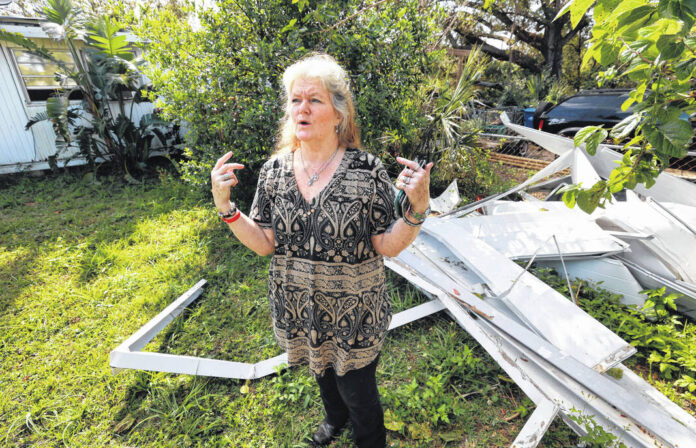ORMOND BEACH, Florida — The problems at Peggy Childress’ mobile home started in May when a tree from the vacant lot next door crashed through their carport, the first damage she or her husband, Mike, could recall in 15 years of living there.
Having the tree removed cost $600, all the money they had in savings. “It wiped us out,” said Childress, 61.
Then Hurricane Ian tore off their roof.
“It was like it was raining inside,” Childress said. Rooms filled with water, then mold.
Childress said she’s gotten estimates of more than $22,000 for repairs, “more than this place is worth.”
As is the case with many owners of manufactured and mobile homes Florida, the Childresses don’t have home insurance, so they will somehow have to cover the full cost of repairs themselves.
“Homeowner’s insurance is a continual challenge for the industry,” said Jim Ayotte, executive director of the Florida Manufactured Housing Association. “The market is dysfunctional, and homeowners are struggling to find coverage that’s affordable.”
There are about 822,000 manufactured and mobile homes in Florida today, according to the Census Bureau, nearly 10% of the total supply of homes.
In 2018, only 260,127 manufactured homes were insured, according to information from the Office of Insurance Regulation. The agency did not return a request for updated information.
Only 1,732 manufactured and mobile homes in Florida carry flood insurance, according to the federal Office of Emergency Management.
Childress said that none of the neighbors that she’s spoken with have insurance on their homes. When she tried to purchase it for her home, she said most insurance companies simply said no.
“You can’t even get like a type of renter’s insurance to cover your belongings,” she said.
Childress said the one policy she was offered was too expensive for her and her husband, who are both on Social Security.
A mobile home is any manufactured home built before a 1976 Housing and Urban Development act changed building standards. More than 300,000 mobile homes that haven’t been required to make those upgrades are still in use in Florida, according to a study from the International Hurricane Research Center.
Childress’ home was built in 1970, according to property records.
In 1992, Hurricane Andrew wiped out 90% of the mobile and manufactured homes in Dade County, according to the National Oceanic and Atmospheric Administration. Afterward, HUD passed new standards on manufactured homes in Florida, requiring improvements to withstand hurricane-force winds.
But more than 600,000 homes predate the new requirements, according to the IHRC.
Childress, who said she was unable to afford the upgrades, says she was even turned down for a policy from the state-run Citizens Property Insurance, the property insurer of last resort.
“Even the insurer of last resort is not a guaranteed insurer” for mobile homes, said Laura Wagner, executive director of Floridians for Honest Lending.
Wagner’s organization, typically a watchdog for predatory lending, got involved in insurance advocacy when its employees started hearing from homeowners — manufactured and other — who were being foreclosed upon for a lack of insurance.
“What we are seeing is people who are getting declined for older roofs, for older water heaters, for older electrical,” she said. “The list is huge now.”
A homeowner is not required to carry insurance if they do not have a mortgage on the property.
But mortgage lenders will not finance a home purchase without proof of insurance on the property. As the crisis in Florida’s property insurance market has shuttered or forced out insurance companies in the state, Wagner says finding insurance even for newer manufactured homes has become more of an issue.
“Every single time you have a shrinkage in the marketplace, you’re going to have those homeowners who struggle to find new insurance,” she said.
Even when a manufactured home can get insurance, it often won’t cover the full replacement of the house, Ayotte says. He says he’s spoken to lenders who refuse to provide financing because the disparity between coverage and costs is too high.
Ayotte said his organization is working with Citizens and others in government to find a solution. “The more our policy makers understand, that insurance is too expensive and many people just aren’t doing it, maybe they’ll pay more attention,” he said.
Childress doesn’t have a mortgage. What she has is mold, no roof and no one coming to help. They have sealed the leaks in their ceiling and are making what repairs they can as they go.
“Eventually, we’ll get things taken care of, with or without help,” she said.







